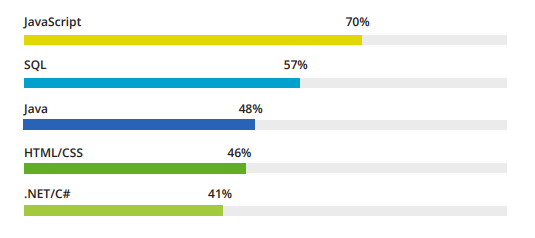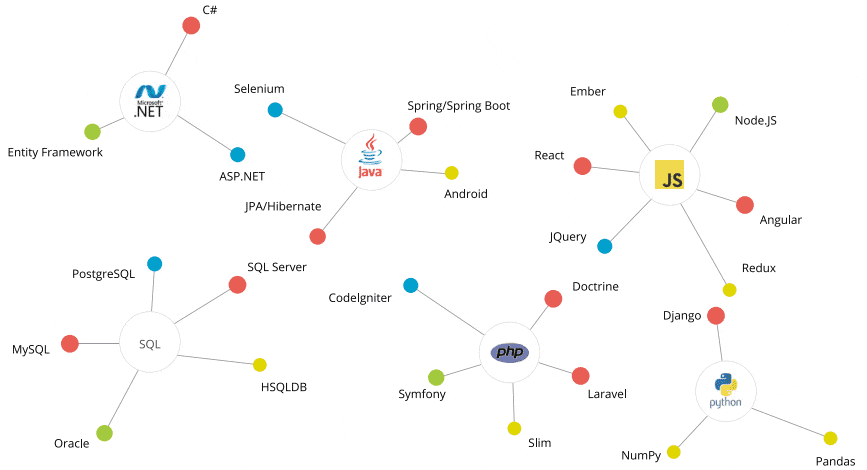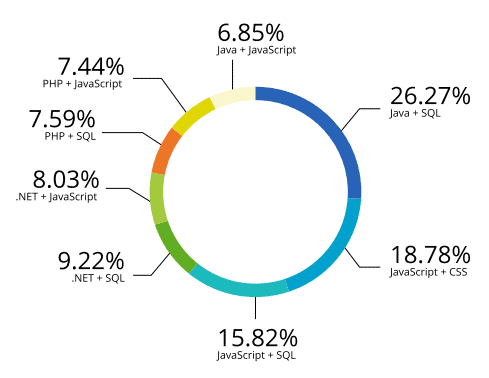Tips from Recruiters to Land a Software Development Job

Did you know that on average, recruiters spend six seconds scanning a resume? When looking at candidates' CVs or online profiles, they mostly check for certain keywords that signal whether you may be a good fit for the position. This can be especially true for technical job roles where hiring managers scan for required technologies and IT certifications. This means you only have these few seconds to make the first cut.
Devskiller, an online platform that facilitates software developer job interviews and screening exams, compiled data from more than 112,000 tests taken by candidates worldwide to create the Devskiller Global Technical Hiring and Skills Report, offering a unique snapshot of the IT and development workforce. This article will present key findings from the report that will help you maximize your chances of passing the resume scan and getting hired.
Let's get started!
Know Which Skills & Platforms Are In-Demand
70% of companies want to hire a software developer with skills in JavaScript. SQL comes in second with 57%, followed by Java in third place with 48%.
Here are the top 5 technologies in which companies are seeking development expertise:

These findings mirror greater industry trends:
- These top four technologies are advertised the most on the Hacker News job board.
- Results from the 2018 Stack Overflow Developer Survey indicate that JavaScript is the most commonly used language for the sixth year running.
I’m not saying you need to reinvent your skill set, but knowing which expertise are in the greatest demand will give you a better understanding of the attractiveness of your skills and how you can best position them to employers.
List your Complimentary Skills in your CV & LinkedIn Profile
You might have great technical skills, but you need to make sure it’s easy for recruiters to find you while they source candidates.
One of the ways to let the recruiter know you have certain skills is to list them in your CV and/or LinkedIn profile. When it comes to LinkedIn, many recruiters rely on keyword searches while sourcing. If you want to be found, make sure to list the skills and platforms you’d like to be hired for in your profile.
How granular should you get? One of the ways to decide is to look at how languages are frequently used with other technologies in their environment. This is reflected in the way companies screen technical skills. This in turn means that these are the “bundles” of skills companies are most interested in.
Most employers use tests that assess multiple skills when recruiting software engineers. As an example, tests focused on Python skills usually test Django, NumPy, and Pandas skills too.
The Most Popular Tech Stacks We Test:

Brush Up those Database Skills
JavaScript comes first on the list of technologies tested together and is most often co-tested with CSS and HTML. Interestingly, SQL is the #2 most co-tested skill across the whole study sample. This shows that database skills are clearly very important to employers. Developers applying for back-end, front-end, and full stack roles usually get a database check, regardless of their seniority level.
The Top 8 Technologies Tested Together:

As a tech candidate, mastering or sharpening your SQL skills seems like a smart career move.
Make a Good First Impression
The halo effect is a cognitive bias where the impression of one quality of a person influences the way we think about their entire character. Example? “A teacher who sees a well-behaved student might tend to assume this student is also bright, diligent, and engaged before that teacher has objectively evaluated the student's capacity in these areas.”The halo effect is very much at play in the recruitment scenario, too. Being likeable and enthusiastic while talking to the recruiter on the phone increases your chances of being seen as an attractive candidate. There’s a line, though. In an efficient technical recruitment process, unconscious bias is alleviated by means of objective technical screening software. And that’s a good thing. Non-viable candidates cannot put on an act and pretend they have the necessary skills anymore.
That said, making a good impression early on will likely give you that little boost at the very beginning of the recruitment process. After all, most tech companies assess both technical (hard) skills and soft skills before making a hiring decision. Therefore, you should establish a rapport with both the tech department and the HR team.
One way to use the halo effect to your advantage is to submit your solution to coding tests in a timely manner. The average software developer takes 2.88 days to submit their solution to a coding test. If you want your prospective employer to think you care about the position, solve the test as soon as you can. If you agree to a deadline (oftentimes companies give candidates one week to complete their coding tests), make sure you meet it.
Want more Developer Recruitment Stats?
The Devskiller Global Technical Hiring & Skills Report 2019 provides a number of insights for job candidates and technical recruiters alike.
